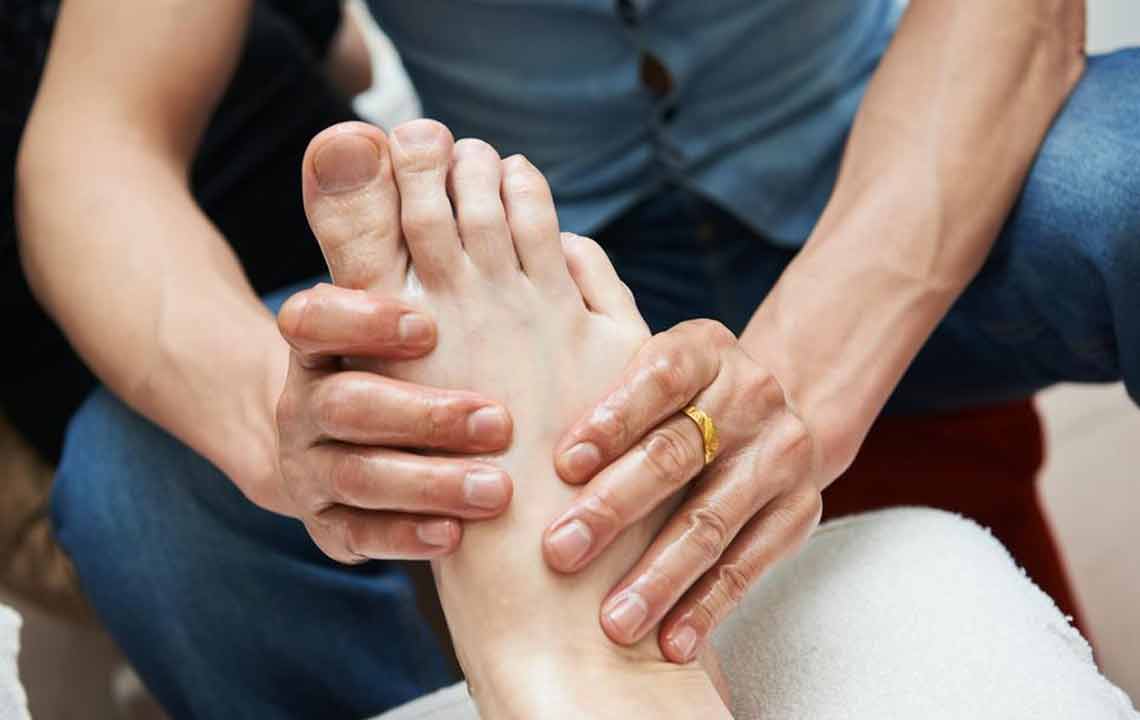Diabetes is a disease that not only restricts your diet pertaining to some food items but brings many more complications with it. One such complication is peripheral neuropathy which is a type of nerve damage due to diabetes. This condition gives you pain, tingling and numbing sensation in hands and feet. This severely affects the lives of people as it causes discomfort in the day-to-day activities which further leads to mood swings.
The pain can be managed to about 30 to 50 percent using over-the-counter (OTC) drugs. However, there is a huge gap that can be filled to make this condition more comfortable for you.
Here are some simple diabetic foot pain treatments to relieve yourself from such a pain.
- Check your blood sugar levels: High blood sugar levels will worsen the condition hence you not only need to maintain strict diet but also be regular with your medicines including insulin if prescribed to you.
- Maintain your body weight: Eat a healthy diet with balanced micro-nutrients that keeps your weight in check. If you are overweight or obese, it is advisable to reach your ideal body weight through balanced diet and workout regime.
- Manage stress levels: High-stress levels are related to hyperglycemia and they shoot up your blood sugar level.
Maintain a healthy lifestyle. While currently, it is impossible to eliminate stress from your lifestyle, following a healthy lifestyle like taking a morning stroll and following a disciplined lifestyle can still eliminate it to an extent.
Take OTC: Some OTC drugs like aspirin, ibuprofen, and naproxen can ease pain caused due to diabetic nerve damage. But we strictly advise you to check with your doctor before self- medicating yourself with these drugs as some of them are blood thinners and can have adverse effects on your heart, kidney, and lungs.
Maintain vitamin D levels: The recommended levels of the vitamin are 600 to 800 IU from food, which is difficult to achieve. You can opt for vitamin D supplements and take early morning sunlight to maintain the vitamin D levels. Studies show that people with less vitamin D in their body suffer from diabetic foot pain more than the ones with high level of vitamin D in their bodies.
Quit smoking: If you are the one who loves to smoke, then you need to stop doing it immediately as smoking constricts your blood vessels affecting your blood circulation. This means that your peripheral nerves will be devoid of nutrient rich blood, leading to more pain.
Make a workout routine: As exercising keeps your blood sugar levels under check, it helps to reduce the diabetic foot pain. Workout also maintains your weight, hence putting less pressure on your feet; it also increases blood circulation to your feet thus causing you less or no pain.
Soak your feet in warm water: Warm water increases blood circulation in your body while relaxing your feet and body at the same time. A word of caution, as in many cases, sensation in feet is lost, you must make sure the water temperature is adequate.
Take some supplements: Taking alpha-lipoic supplements can help prevent nerve damage, and if you already have some nerve damage, a regular dose of the antioxidant helps relieve the pain. It regulates the blood sugar level hence easing the pain. Though a daily limit of 600 mg is recommended to ease almost 19% of the symptom, we advise you to consult your doctor before taking one.
Intake foods and supplements with vitamin B complex: Deficiency of vitamin B12 leads to nerve damage, causing pain, while vitamin B6 helps the brain produce information sending chemical, the deficiency of which causes pain. You can get these required vitamins through food, but you can check with your doctor if your body needs them through supplements to meet the required balance.
Apply Capsaicin cream: It is a compound found in peppers and chilies. These compounds are power packed in form of creams that can be applied on pain areas on foot. They produce a sensation that eases pain and nerve damage.
Employ some relaxation techniques: A consistent pain affects your lifestyle and day-to-day activities and takes a toll on mental health. A lot of diabetics complain of depression and mood swings. Your doctor might prescribe you some medicines to relieve you from mood swings and can possibly suggest
Opt for Biofeedback: Here your heart rate, brain waves, and temperature are monitored, helping you learn how to control your body’s response to pain and related issues.
Indulge in relaxation techniques: The doctor here advises you about breathing exercises, yoga, meditation, massage, and visualization techniques which help relieve the diabetic foot pain. Don’t be disheartened if you have diabetes and are suffering from foot pain and other issues. All the symptoms, pain, and issues related to diabetes can be managed by a disciplined lifestyle and regular blood sugar monitoring, which can be done at home. However, before following these diabetic foot pain treatments it is advisable to consult your doctor.
Disclaimer:The content provided on our blog site traverses numerous categories, offering readers valuable and practical information. Readers can use the editorial team’s research and data to gain more insights into their topics of interest. However, they are requested not to treat the articles as conclusive. The website team cannot be held responsible for differences in data or inaccuracies found across other platforms. Please also note that the site might also miss out on various schemes and offers available that the readers may find more beneficial than the ones we cover.


